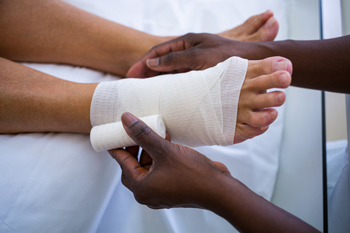
Debridement wound care is often necessary for the proper healing and prevention of complications in foot wounds. Debridement, whether with special dressings, maggots, or mechanical methods, aids in removing dead or infected tissue and facilitates healing. After this procedure, it is important to regularly change the dressing, as per your podiatrist’s instructions. Keeping the dressing dry by avoiding activities like swimming or hot tubs is vital. Always maintain cleanliness by washing your hands before and after touching the wound. Avoid applying pressure and use cushions or crutches, if necessary. While debridement carries potential risks like irritation, bleeding, or infection, its benefits often outweigh these. Pay attention to signs of infection, such as increasing pain, redness, swelling, or fever. If you have foot wounds or have had a debridement procedure and healing is slower than expected or shows signs of infection, it is strongly suggested that you schedule an appointment with a podiatrist for care.
Wound care is an important part in dealing with diabetes. If you have diabetes and a foot wound or would like more information about wound care for diabetics, consult with Bruce Smit, DPM from Frankfort Foot & Ankle Clinic. Our doctor will assess your condition and provide you with quality foot and ankle treatment.
What Is Wound Care?
Wound care is the practice of taking proper care of a wound. This can range from the smallest to the largest of wounds. While everyone can benefit from proper wound care, it is much more important for diabetics. Diabetics often suffer from poor blood circulation which causes wounds to heal much slower than they would in a non-diabetic.
What Is the Importance of Wound Care?
While it may not seem apparent with small ulcers on the foot, for diabetics, any size ulcer can become infected. Diabetics often also suffer from neuropathy, or nerve loss. This means they might not even feel when they have an ulcer on their foot. If the wound becomes severely infected, amputation may be necessary. Therefore, it is of the upmost importance to properly care for any and all foot wounds.
How to Care for Wounds
The best way to care for foot wounds is to prevent them. For diabetics, this means daily inspections of the feet for any signs of abnormalities or ulcers. It is also recommended to see a podiatrist several times a year for a foot inspection. If you do have an ulcer, run the wound under water to clear dirt from the wound; then apply antibiotic ointment to the wound and cover with a bandage. Bandages should be changed daily and keeping pressure off the wound is smart. It is advised to see a podiatrist, who can keep an eye on it.
If you have any questions, please feel free to contact our office located in Frankfort, IL . We offer the newest diagnostic and treatment technologies for all your foot care needs.